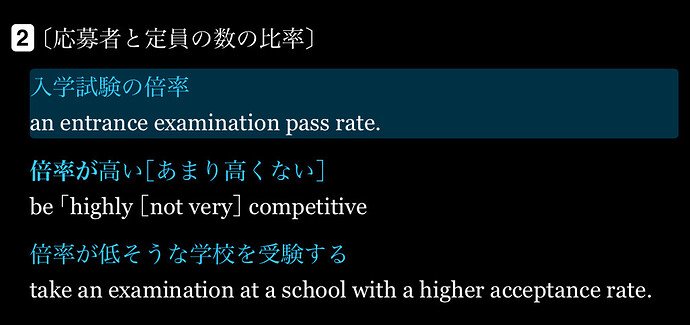Shouldn’t these two translations be switched? 倍率が高い means low acceptance rate and 倍率が低い means high acceptance rate, unless I’m misunderstanding how this word works.
maybe im undeducated on this word but I dont see a problem with the sentence 倍率 = applicant to acceptance ratio so if ‘倍率が高い’ it means the applicant to acceptance ratio is high)?)
Could be wrong though
After thinking about this some more, I have the same question. In English, a test with a low pass rate is a difficult test, meaning you need to study hard to be one of the few that get a passing grade.
But looking at some example sentences from 神話英大辞典, 倍率が高い means difficult/ highly competitive, and 倍率が低そう means high acceptance rate, the opposite of what I was expecting.
I think 倍率 is a bit of a weird one, because in English we tend to think of things like acceptance rates in terms of percentage, so a high percentage of acceptance = an easy school to get into, and vice versa.
However, with 倍率 the acceptance rate is expressed in multiples.
第1位は「東京芸術大学」でした。 募集人員471人に対し、志願者数は3664人、志願倍率は7.8倍です。
In the sentence above, the 倍率 of 東京芸術大学 is 7.8, because although 3664 people applied, only 471 were admitted. Therefore, we can say this university is 倍率が高い. On the flip side, if say 1000 people applied, and 500 people were admitted, the 倍率 would be 2倍 and we could say it is 倍率が低い.
Hope that makes sense!
P.S. I would report those two sentences using the feedback button. Most of the N1 sentences were translated with ChatGPT and are in the process of being reviewed, so there are still cases where the translations aren’t correct.
I think the question is also, if Bunpro’s translation / accepted term should be adjusted.
倍率 acceptance rate, pass rate (of an exam, etc.)
JMDict lists it less confusingly, so high stays high and low stays low:
倍率 competitiveness rating (e.g. for university entrance); applicant-to-acceptance ratio
Yeah, there are other vocab terms on BunPro like 有効求人倍率 where the translation makes more sense (Ratio of job openings to job applicants). I think this is just one of those very unintuitive word for English speakers, where the Japanese way of thinking about this runs in the opposite direction from what we are used to.
I haven’t had to interact with university admissions in either Japan or US, but back where I was a student, the metric of admission difficulty was “how many people apply per each available spot”, same as 倍率. So it doesn’t feel particularly foreign.



